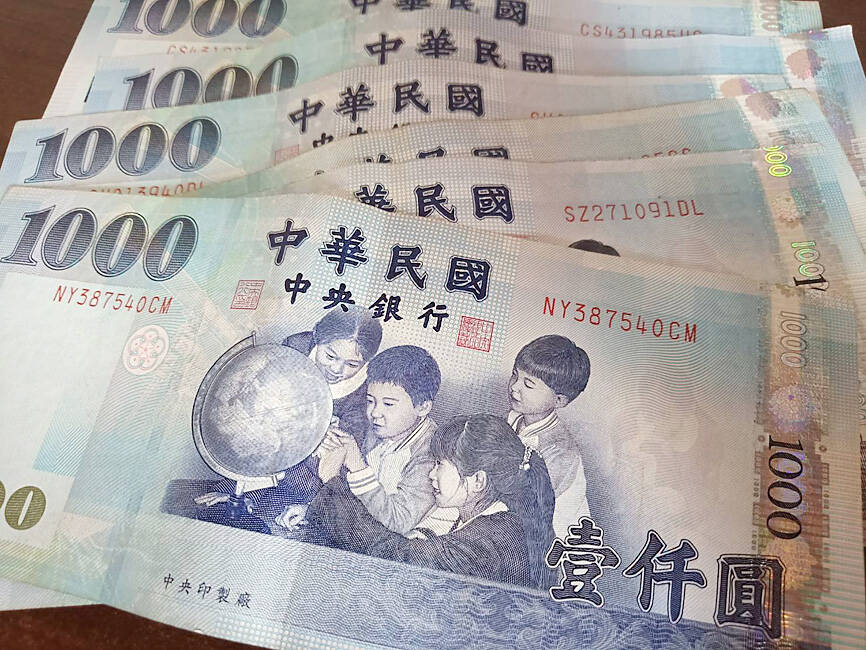The number of incidents of major tax evasion last year dropped to 915, while unpaid taxes eased to NT$89.51 billion (US$2.75 billion), as some evaders chose to cooperate while the tax recovery period expired for others, the Ministry of Finance said yesterday.
The ministry has since July 1, 2010, published a list of top tax evaders annually in hopes of pressuring them to pay their dues.
Major tax evaders are people and companies that owe the government more than NT$10 million and NT$50 million respectively in back taxes.

Photo: Tsai Ching-hua, Taipei Times
The list this year is similar to previous years, with late business tycoon and socialite Huang Jen-chung (黃任中) topping the list, owing NT$1.94 billion in estate tax. His older sister, Huang Hsin-ping (黃新平), ranked third, with NT$1.26 billion in back taxes.
His son, Huang Juo-ku (黃若谷), who had NT$1.9 billion in back taxes, was removed from the list after the recovery period expired in 2022, the ministry said.
There is little the ministry can do about the Huang family, as they do not own properties in Taiwan that the government can take, the ministry has said, adding that they would seek assistance at home and abroad once it finds traces of taxable assets.
The Kaohsiung-based family of real-estate businessman Huang Cheng-chih (黃承志) remained second, with NT$1.51 billion in unpaid income and estate taxes. He was the former head of Fu Yow Enterprise Co (婦幼實業) and was charged with fraud in 2001. Huang Cheng-chih has since fled to China.
Hsu-Cheng Wen-wen (許鄭溫溫) is new to the list, with back taxes of NT$521 million. She was the wife of Cosmos Bank (萬泰銀行) founder and chairman Hsu Sheng-fa (許勝發), who passed away in 2019. The court last year handed down a ruling on Hsu-Cheng’s case and confirmed she was the inheritor of her husband’s estate.
As for corporate tax evaders, Holiday Inn Asiaworld Taipei (環亞飯店), which changed ownership and became Illume Taipei (茹曦酒店), topped the list with NT$2.18 billion in back taxes, ministry data showed.
Asiaworld Taipei was followed by two Taichung-based nightclubs owing NT$1.16 billion and NT$1.09 billion in back taxes each.
The maximum tax recovery period is 15 years, following legal revisions in 2007, Huang Jen-chung’s case would stay valid until 2032, as the revision does not apply to old cases.

MULTIFACETED: A task force has analyzed possible scenarios and created responses to assist domestic industries in dealing with US tariffs, the economics minister said The Executive Yuan is tomorrow to announce countermeasures to US President Donald Trump’s planned reciprocal tariffs, although the details of the plan would not be made public until Monday next week, Minister of Economic Affairs J.W. Kuo (郭智輝) said yesterday. The Cabinet established an economic and trade task force in November last year to deal with US trade and tariff related issues, Kuo told reporters outside the legislature in Taipei. The task force has been analyzing and evaluating all kinds of scenarios to identify suitable responses and determine how best to assist domestic industries in managing the effects of Trump’s tariffs, he

TIGHT-LIPPED: UMC said it had no merger plans at the moment, after Nikkei Asia reported that the firm and GlobalFoundries were considering restarting merger talks United Microelectronics Corp (UMC, 聯電), the world’s No. 4 contract chipmaker, yesterday launched a new US$5 billion 12-inch chip factory in Singapore as part of its latest effort to diversify its manufacturing footprint amid growing geopolitical risks. The new factory, adjacent to UMC’s existing Singapore fab in the Pasir Res Wafer Fab Park, is scheduled to enter volume production next year, utilizing mature 22-nanometer and 28-nanometer process technologies, UMC said in a statement. The company plans to invest US$5 billion during the first phase of the new fab, which would have an installed capacity of 30,000 12-inch wafers per month, it said. The

Taiwan’s official purchasing managers’ index (PMI) last month rose 0.2 percentage points to 54.2, in a second consecutive month of expansion, thanks to front-loading demand intended to avoid potential US tariff hikes, the Chung-Hua Institution for Economic Research (CIER, 中華經濟研究院) said yesterday. While short-term demand appeared robust, uncertainties rose due to US President Donald Trump’s unpredictable trade policy, CIER president Lien Hsien-ming (連賢明) told a news conference in Taipei. Taiwan’s economy this year would be characterized by high-level fluctuations and the volatility would be wilder than most expect, Lien said Demand for electronics, particularly semiconductors, continues to benefit from US technology giants’ effort

‘SWASTICAR’: Tesla CEO Elon Musk’s close association with Donald Trump has prompted opponents to brand him a ‘Nazi’ and resulted in a dramatic drop in sales Demonstrators descended on Tesla Inc dealerships across the US, and in Europe and Canada on Saturday to protest company chief Elon Musk, who has amassed extraordinary power as a top adviser to US President Donald Trump. Waving signs with messages such as “Musk is stealing our money” and “Reclaim our country,” the protests largely took place peacefully following fiery episodes of vandalism on Tesla vehicles, dealerships and other facilities in recent weeks that US officials have denounced as terrorism. Hundreds rallied on Saturday outside the Tesla dealership in Manhattan. Some blasted Musk, the world’s richest man, while others demanded the shuttering of his